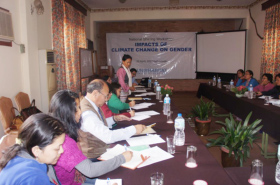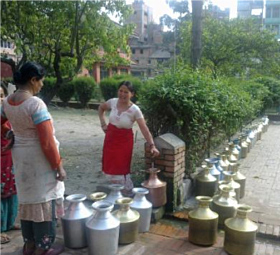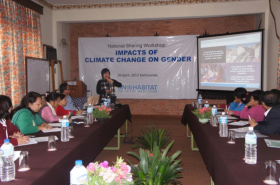 FIGURE 1 HON. ANG DAWA SHERPA, MEMBER, CONSTITUTION ASSEMBLY ADDRESSING THE NATIONAL SHARING WORKSHOP
FIGURE 1 HON. ANG DAWA SHERPA, MEMBER, CONSTITUTION ASSEMBLY ADDRESSING THE NATIONAL SHARING WORKSHOPUN-Habitat has developed a checklist for mainstreaming gender under the second phase of Cities and Climate Change Initiatives (CCCI) initiated by UN-Habitat in 20 cities of 13 countries. The check list is being tested in different countries and Nepal (Kathmandu Valley) is one of those few countries chosen by UN-Habitat. The purpose of testing the tool is (a) to test, tailor and disseminate the gender and climate change checklist in the context of Kathmandu Valley (b) to disseminate the findings to the stakeholders for adaptation of the toolkit to mainstream gender in climate change initiatives.
The checklist had been tested in Kathmandu valley varying from policy makers to local authorities and even incorporated valuable inputs from the communities with specific focus on women and their respective experiences and concerns.
To share the findings of the tested checklist, a dissemination workshop was organized on 10th April 2012 in Kathmandu bringing together individual experts and those participated in the interaction, representatives from, all the five municipalities in the Kathmandu Valley and representatives from civil society organizations and grassroots organizations and the government. The major objectives of this gathering are:
- Sharing the findings and way forward at national, municipal and neighborhood level and validate the findings,
- Receive feedback on the findings and for UN-Habitat to move ahead
 FIGURE 2 QUEUING FOR WATER: THE OBVIOUS IMPACT OF CLIMATE CHANGE OBSERVED IN KATHMANDU COUPLED WITH URBANIZATION ON GENDER RELATED ISSUES.
FIGURE 2 QUEUING FOR WATER: THE OBVIOUS IMPACT OF CLIMATE CHANGE OBSERVED IN KATHMANDU COUPLED WITH URBANIZATION ON GENDER RELATED ISSUES.The objectives of the dissemination workshop were achieved to a greater extent. For example (a) the findings from the test, reflections and suggestions were shared (b) a very good feedback received on the presentations and way forward for UN-Habitat. The most exciting part of this workshop is that it is actively participated by ranges of representation from policy makers to implementations to grass-root women groups. This forum provided avenues to share the concerns and issues from multi dimensional perspectives opening door to new avenues.
 FIGURE 3 MS. LOWIE ROSALES, HSO, UN-HABITAT BRINGING IN THE GLOBAL CLIMATE CHANGE AND GENDER CONTEXT IN THE WORKSHOP
FIGURE 3 MS. LOWIE ROSALES, HSO, UN-HABITAT BRINGING IN THE GLOBAL CLIMATE CHANGE AND GENDER CONTEXT IN THE WORKSHOPThis interaction on findings of the testing of the tool kit on Impact of Climate Change on Gender is not a beginning and end in itself. Addressing the meeting Ms. Meena Khanal, Joint Secretary of Ministry of Environment thanked UN-Habitat to bring in such an important issue and urged the participants to focus on gender perspective particularly impact on women health. In the climate change initiatives women should not be limited to passive receivers but they should be involved in the process giving them leading role. Ms. Ang Dawa Shrepa, Honorable member of Constitution Assembly highlighted the situation of women in Nepal and called for a gender-focused action while building climate resilient society.
The workshop provided insights for UN-Habitat to build upon what has been done so far and contribute in addressing the impact of Climate Change on Gender. As suggested by the participants the findings need to be a rolling document and fine-tuned further so that it can be validated at all level. Similarly, the toolkit need to be finalized with wider consultations as suggested, translated into Nepali and other regional languages so that it can be understood and applied with ease at all level for benchmarking the impact of Climate Change on Gender and plan actions to minimize the impact on gender at all level.




















